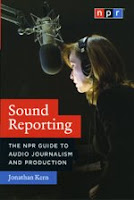In the first chapter, Kern writes that "Radio is intimate." That's probably the best thing to remember about your audience...they're not "all out there." Instead you're talking to one person...telling him (or her) a story you'd like them to hear.
His idea that there "are no headlines" (p. 4) in radio is obvious...so we always try to make sure our "important stories come first and get more airtime." (p.5) (Exercise: Pick out five stories for our newscast, and put them in the right order...it's not aways obvious, and is usually good for some healthy newsroom debate.) How do we figure out what the "important" stories are? See Kern's chapter 10 description in a discussion of "Newscasts" - but better yet, reference Jay Kernis' "Four Tiers of News Coverage."
Despite our best efforts to put the best stories first, some listeners might miss an important
 story or two along the way. And, when that happens, they "can't re-listen to a story the way they can a newspaper article." (p. 6) As I've said in class - radio is a linear medium. It keeps going, even if a listener is left behind. It's your job to make sure they don't get left behind.
story or two along the way. And, when that happens, they "can't re-listen to a story the way they can a newspaper article." (p. 6) As I've said in class - radio is a linear medium. It keeps going, even if a listener is left behind. It's your job to make sure they don't get left behind."Fairness" is an important issue that starts coming up in people's lives in about...well, preschool, and remains important throughout. Although I was often told as a child that "life isn't fair" - that doesn't mean whe shouldn't be trying at all times to be fair in our reporting. In this class, I'll present a few "Codes of Ethics." NPR's talks about "fair, unbiased, accurate, complete and honest" reporting. (p. 9) This very high-minded ideal can be torpedoed by what Kern calls "The Echo Chamber" (p. 10) - the tendency of like-minded journalists to talk amongst themselves, and talk themselves into stories they maybe shouldn't cover...a concept explained on the show On The Media.
Kern gives examples of "getting both sides" (p. 21) of a story...something easier said than done, and often at odds with our need to get news on right now. And, he takes on "loaded language" (p. 23) that is often the result of lazy writing, or reporting or both.
Finally, Kern's chapter on radio writing is far more expansive than my simplified "Basic Rules of Broadcast Writing," but serves the same purpose: To give you tips and hints to keep where you work...and to refer back to again and again.
No comments:
Post a Comment